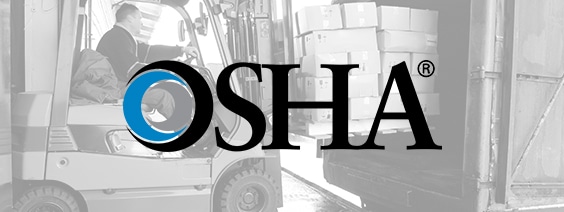OSHA 1910.178 – Forklift Certification Requirements
OSHA, the Occupational Safety & Health Administration, requires all forklift/equipment operators to be trained and certified – qualified – as a competent operator prior to permitting your employee(s) to operate the equipment (with an exception during supervised training).
What is a powered industrial truck? The Occupational Safety and Health Act, 1910.178, covers all aspects of requirements for Powered Industrial Trucks, which is defined as: fork trucks, tractors, platform lift trucks, motorized hand trucks, and other specialized industrial trucks powered by electric motors or internal combustion engines.
If your company uses golf carts or gators and/or any equipment to move material and/or personnel, it is very likely that the training requirements will fall under section 1910.178. Even if there is no requirement found under the regulations that covers the training requirements for an equipment, the employer is obligated to provide training to all employees in accordance with the manufacturer’s requirements.
The training requirements are specified in section 1910.178(l) which requires the following components to certify your operator: theory training, practical training and a driving test (evaluation). In order to demonstrate that your training and certification was completed, you may be required to prove to an OSHA safety officer by means of documentation. Therefore, the entire process must be thoroughly documented. An OSHA safety officer may even speak directly with your operator to gauge the effectiveness of your training – whether internal or external training is conducted.
Theory training can be conducted in the traditional classroom format using physical training material or the theory training can be conducted online through a learning management system. We believe there are benefits in conducting training in either format, though regardless of the method used, the training should always include site specific requirements found at your workplace.
Practical training is crucial for beginner operators to be able to gain operational experience under the guidance of a trained and qualified instructor. The duration of practical training is truly unknown as this is dependent on your operator’s ability to safely operate the equipment. For experienced operators, conducting practical training is key in the early detection of bad habits that may have been formed over the past few years.
The driving test (evaluation) is the final component of your certification program where your operator should be conducting real everyday work in the working environment. The evaluation should not be conducted in an empty parking lot using pallets as this is likely not the conditions or tasks your operator will be conducting once certified. Your evaluation should also incorporate the different operating conditions within your facility e.g. indoors, outdoors, ramps, trailers, etc.
To learn more about the NIS Train the Trainer Program, feel free to call us at 1-866-344-3950 or visit NIS Train the Trainer Programs for further information.

